176 start with C start with C

Calling from the Scaffold is a collection of poems about connecting and not connecting—of approaching the brink of connecting. It’s about paying tribute and salvaging and gratitude. The voices vary in their longings: we hear from men and women, the young and no longer young. Nature often is there to help them out. The poet, also a writer of fiction and nonfiction, is interested in story, in his characters’ ability to move down the road, searching for their best selves, best home, putting together the pieces that move them toward that famous happy ending.

A Lit Hub Favorite Book of 2018
The speaker in Cape Verdean Blues is an oracle walking down the street. Shauna Barbosa interrogates encounters and the weight of their space. Grounded in bodily experience and the phenomenology of femininity, this collection provides a sense of Cape Verdean identity. It uniquely captures the essence of “Sodade,” as it refers to the Cape Verdean American experience, and also the nostalgia and self-reflection one navigates through relationships lived, lost, and imagined. And its layers of unusual imagery and sound hold the reader in their grip.
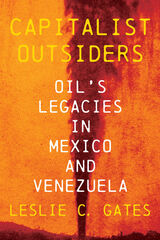
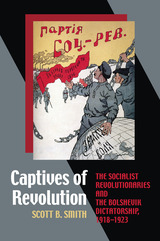
The Socialist Revolutionaries (SRs) were the largest political party in Russia in the crucial revolutionary year of 1917. Heirs to the legacy of the People’s Will movement, the SRs were unabashed proponents of peasant rebellion and revolutionary terror, emphasizing the socialist transformation of the countryside and a democratic system of government as their political goals. They offered a compelling, but still socialist, alternative to the Bolsheviks, yet by the early 1920s their party was shattered and its members were branded as enemies of the revolution. In 1922, the SR leaders became the first fellow socialists to be condemned by the Bolsheviks as “counter-revolutionaries” in the prototypical Soviet show trial.
In Captives of the Revolution, Scott B. Smith presents both a convincing account of the defeat of the SRs and a deeper analysis of the significance of the political dynamics of the Civil War for subsequent Soviet history. Once the SRs decided to openly fight the Bolsheviks in 1918, they faced a series of nearly impossible political dilemmas. At the same time, the Bolsheviks fatally undermined the revolutionary credentials of the SRs by successfully appropriating the rhetoric of class struggle, painting a simplistic picture of Reds versus Whites in the Civil War, a rhetorical dominance that they converted into victory over the SRs and any left-wing alternative to Bolshevik dictatorship. In this narrative, the SRs became a bona fide threat to national security and enemies of the people—a characterization that proved so successful that it became an archetype to be used repeatedly by the Soviet leadership against any political opponents, even those from within the Bolshevik party itself.
In this groundbreaking study, Smith reveals a more complex and nuanced picture of the postrevolutionary struggle for power in Russia than we have ever seen before and demonstrates that the Civil War—and in particular the struggle with the SRs—was the formative experience of the Bolshevik party and the Soviet state.
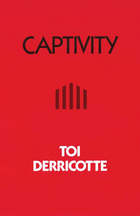
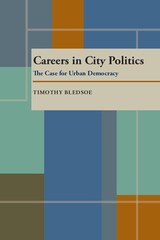
Timothy Bledsoe bases his findings on the political careers of more than eight-hundred city council members representing cities with large and medium populations. Tracing how some officials' careers unfolded over five years, Bledsoe studies their reasons for seeking office and examines how successful they were in adapting to their jobs. He evaluates office-holders whose council careers were cut short and those whose lengthy service qualified them as “careerists,” paying special attention to first-term officials and to those who used their seats as stepping-stones to higher political offices. In this first-of-its-kind study, Bledsoe offers specific recommendations for restoring some of the lost vigor to local politics.

Stylistically innovative, deeply moving, carefully researched, Martha Collins’s eleventh volume of poetry combines her well-known attention to social issues with the elegiac mode of her previous book. She focuses here on race, gun violence, recent wars, and, in an extended sequence, the history of coal—first as her ancestors mined it, then from its geological origins to our ecologically threatened present. Casualty Reports is both indictment and lament, a work that speaks forcefully to our troubled history and our present times.
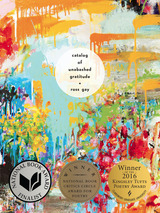
Winner, 2016 Kingsley Tufts Poetry Prize
Finalist, 2015 National Book Award, poetry category
Finalist, 2015 NAACP Image Awards, poetry category
Catalog of Unabashed Gratitude is a sustained meditation on that which goes away—loved ones, the seasons, the earth as we know it—that tries to find solace in the processes of the garden and the orchard. That is, this is a book that studies the wisdom of the garden and orchard, those places where all—death, sorrow, loss—is converted into what might, with patience, nourish us.
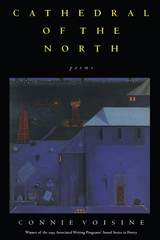
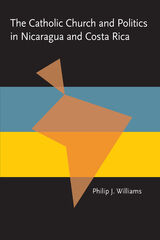
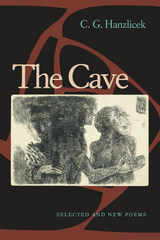

CEASE begins with the words, “to keep the peace/we need a wall/to fall to our knees before….” Framed by the long poem, “wall,” Beth Bachmann’s new collection of poetry wildly upturns the boundaries between bodies at peace and bodies at war, between the human territory of border walls and the effects of war on the environment and landscape, between the movements of soldiers and of refugees, between terror as an interior state and violences performed on the body, and between the words of politicians and the breath of a poem. Taking up Muriel Rukeyser’s call for women poets to respond to war, “Women and poets see the truth arrive,” the poems in CEASE are almost breathless in their speed and presence on the page. CEASE is both a plea and an awakening to peace as a process and a transient state.
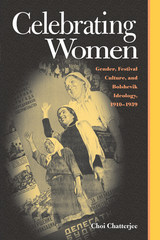
Choi Chatterjee analyzes both Bolshevik attitudes towards women and invented state rituals surrounding Women’s Day in Russia and the early Soviet Union to demonstrate the ways in which these celebrations were a strategic form of cultural practice that marked the distinctiveness of Soviet civilization, legitimized the Soviet mission for women, and articulated the Soviet construction of gender. Unlike previous scholars who have criticized the Bolsheviks’ for repudiating their initial commitment to Marxist feminism, Chatterjee has discovered considerable continuity in the way that they imagined the ideal woman and her role in a communist society.
Through the years, Women’s Day celebrations temporarily empowered women as they sang revolutionary songs, acted as strong protagonists in plays, and marched in processions carrying slogans about gender equality. In speeches, state policies, reports, historical sketches, plays, cartoons, and short stories, the passive Russian woman was transformed into an iconic Soviet Woman, one who could survive, improvise, and prevail over the most challenging of circumstances.
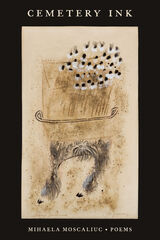

With humor and compassion, George Bilgere continues his explorations of the human predicament. The settings of these poems range from Cleveland to Berlin, from childhood to old age. Bilgere’s subject, in the largest sense, is America, in all its craziness, its haunted past, its imperiled future. But what really centers this book is the English language itself, which these poems endeavor to renew, reinvent, and reinvigorate.
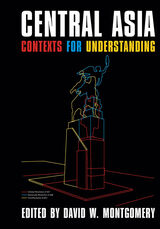
Honorable Mention, 2023 CESS Outreach Award
Central Asia is a diverse and complex region of the world often characterized in the West as being difficult to access. Central Asia: Contexts for Understanding offers the most comprehensive introduction to the region available. Combining thematic chapters with case studies, readers will learn to appreciate the interconnected aspects of life in Central Asia. These wide-ranging, easy-to-understand contributions from some of the leading scholars in the field provide the context needed to understand Central Asia and presents a launching-off point for further research.
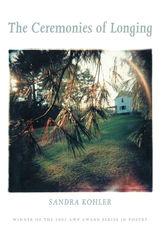
In a poetic voice that is at once reflective and lively, Sandra Kohler explores the patterns of everyday life and the inner drama of imagination. Though these poems are mostly set amidst the familiarity of a suburban household and the family garden, this environment appears far from mundane as Kohler peels away the veneer of domestic tranquility to reveal a world busy with human passion and the rhythms of the earth. Nature is present at every turn, an ethereal twin, as the narrator’s emotions take the form of cardinals in flight, a rushing river, or a potato sprouting from the dark.
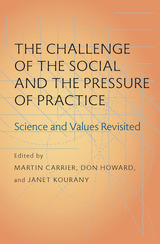
In The Challenge of the Social and the Pressure of Practice, philosophers, sociologists, and historians of science offer a multidisciplinary view of the complex interrelationships of values in science and society in both contemporary and historic contexts. They analyze the impact of commercialization and politicization on epistemic aspirations, and, conversely, the ethical dilemmas raised by “practically relevant” science in today's society. For example, much scientific research over the past quarter century has been guided by the financing that supports it. What effect has this had on the quality of research produced and the advancement of real knowledge?
The contributors reveal how social values affect objectivity, theory, and the direction of inquiry, and examine the byproducts of external value systems in topics such as “expertise” and “socially robust knowledge,” among others. They view science's own internal value systems, the earlier disconnection of societal values from the scientific process, and the plausibility of “value free” science.
The Challenge of the Social and the Pressure of Practice presents an in-depth analysis that places the role of values at the center of philosophical debate and raises questions of morality, credibility, and the future role of values in scientific inquiry.
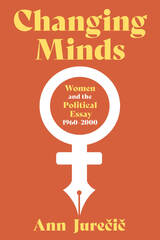
In Changing Minds: Women and the Political Essay, 1960–2000, Ann Jurečič documents the work of five paradigm-shifting essayists who transformed American thought about urgent political issues. Rachel Carson linked science and art to explain how pesticides threatened the Earth’s ecosystems. Hannah Arendt redefined “evil” for a secular age after Eichmann was tried in Jerusalem. Susan Sontag’s interest in the intersection of politics and aesthetics led her to examine the ethics of looking at photographs of suffering. Joan Didion became a political essayist when she questioned how rhetoric and sentimental narratives corrupted democratic ideals. Patricia J. Williams continues to write about living under a justice system that has attempted to neutralize race, gender, and the meaning of history. These writers reacted to the stressors of the late twentieth century and in response reshaped the essay for their own purposes in profound ways. With this volume, Jurečič begins to correct the longstanding dearth of scholarly studies on the importance of women and their political essays—works that continue to be relevant more than two decades into the twenty-first century.
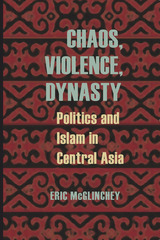
In the post-Soviet era, democracy has made little progress in Central Asia. In Chaos, Violence, Dynasty, Eric McGlinchey presents a compelling comparative study of the divergent political courses taken by Kyrgyzstan, Uzbekistan, and Kazakhstan in the wake of Soviet rule. McGlinchey examines economics, religion, political legacies, foreign investment, and the ethnicity of these countries to evaluate the relative success of political structures in each nation.
McGlinchey explains the impact of Soviet policy on the region, from Lenin to Gorbachev. Ruling from a distance, a minimally invasive system of patronage proved the most successful over time, but planted the seeds for current “neo-patrimonial” governments. The level of direct Soviet involvement during perestroika was the major determinant in the stability of ensuing governments. Soviet manipulations of the politics of Uzbekistan and Kazakhstan in the late 1980s solidified the role of elites, while in Kyrgyzstan the Soviets looked away as leadership crumbled during the ethnic riots of 1990. Today, Kyrgyzstan is the poorest and most politically unstable country in the region, thanks to a small, corrupt, and fractured political elite. In Uzbekistan, Islam Karimov maintains power through the brutal suppression of disaffected Muslims, who are nevertheless rising in numbers and influence. In Kazakhstan, a political machine fueled by oil wealth and patronage underlies the greatest economic equity in the region, and far less political violence.
McGlinchey’s timely study calls for a more realistic and flexible view of the successful aspects of authoritarian systems in the region that will be needed if there is to be any potential benefit from foreign engagement with the nations of Central Asia, and similar political systems globally.
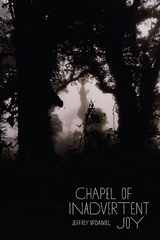
“Reading Jeffrey McDaniel’s gorgeously dark and utterly compelling Chapel of Inadvertent Joy reminds me that he is probably the most important poet in America. The book in your hands was written by a master of metaphor and a poet of huge imagination and fierce ingenuity, a fine antidote to realism. Get this voice in your head.”
—Major Jackson

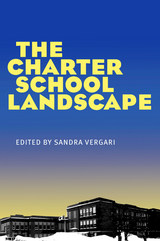
The first charter school opened in Minnesota in 1992. Within nine years, there were more than 2,000 charter schools operating in thirty-four states, Washington, D.C., and Alberta, Canada. Public discourse on the charter school reform is often passionate and politically motivated. Sandra Vergari has assembled a group of experts to present a more reflective and scholarly discussion of the reform, its performance to date, and its implications for public policy.
Each chapter focuses on a single state or province, and systematically addresses such issues as charter school laws, the politics of policy implementation, charter school accountability, controversies and trends, and prospects for the future. In addition, the contributors emphasize significant issues specific to each state that offer lessons for analysts and policymakers everywhere. As a whole, The Charter School Landscape suggests that charter schools are having a significant impact on the institution of public education and how we think about the concept of the "real public school.”

Chatham Village, located in the heart of Pittsburgh, is an urban oasis that combines Georgian colonial revival architecture with generous greenspaces, recreation facilities, surrounding woodlands, and many other elements that make living there a unique experience. Founded in 1932, it has gained international recognition as an outstanding example of the American Garden City planning movement and was named a National Historic Landmark in 2005.
Chatham Village was the brainchild of Charles F. Lewis, then director of the Buhl Foundation, a Pittsburgh-based charitable trust. Lewis sought an alternative to the substandard housing that plagued low-income families in the city. He hired the New York–based team of Clarence S. Stein and Henry Wright, followers of Ebenezer Howard’s utopian Garden City movement, which sought to combine the best of urban and suburban living environments by connecting individuals to each other and to nature.
Angelique Bamberg provides the first book-length study of Chatham Village, in which she establishes its historical significance to urban planning and reveals the complex development process, social significance, and breakthrough construction and landscaping techniques that shaped this idyllic community. She also relates the design of Chatham Village to the work of other pioneers in urban planning, including Frederick Law Olmsted Sr., landscape architect John Nolen, and the Regional Planning Association of America, and considers the different ways that Chatham Village and the later New Urbanist movement address a common set of issues. Above all, Bamberg finds that Chatham Village’s continued viability and vibrance confirms its distinction as a model for planned housing and urban-based community living.
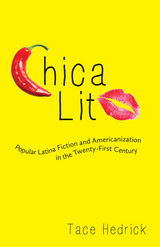
In Chica Lit: Popular Latina Fiction and Americanization in the Twenty-First Century, Tace Hedrick illuminates how discourses of Americanization, ethnicity, gender, class, and commodification shape the genre of “chica lit,” popular fiction written by Latina authors with Latina characters. She argues that chica lit is produced and marketed in the same ways as contemporary romance and chick lit fiction, and aimed at an audience of twenty- to thirty-something upwardly mobile Latina readers. Its stories about young women’s ethnic class mobility and gendered romantic success tend to celebrate twenty-first century neoliberal narratives about Americanization, hard work, and individual success. However, Hedrick emphasizes, its focus on Latina characters necessarily inflects this celebratory mode: the elusiveness of meaning in its use of the very term “Latina” empties out the differences among and between Latina/o and Chicano/a groups in the United States. Of necessity, chica lit also struggles with questions about the actual social and economic “place” of Latinas and Chicanas in this same neoliberal landscape; these questions unsettle its reliance on the tried-and-true formulas of chick lit and romance writing. Looking at chica lit’s market-driven representations of difference, poverty, and Americanization, Hedrick shows how this writing functions within the larger arena of struggles over popular representation of Latinas and Chicanas.
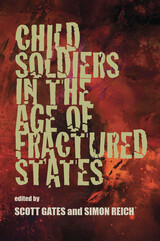
The contributors seek to eliminate myths of historic or culture-based violence, and instead look to common traits of chronic poverty and vulnerable populations. Individual essays examine topics such as: the legal and ethical aspects of child soldiering; internal UN debates over enforcement of child protection policies; economic factors; increased access to small arms; displaced populations; resource endowments; forced government conscription; rebel-enforced quota systems; motivational techniques employed in recruiting children; and the role of girls in conflict.
The contributors also offer viable policies to reduce the recruitment of child soldiers such as the protection of refugee camps by outside forces, “naming and shaming,” and criminal prosecution by international tribunals. Finally, they focus on ways to reintegrate former child soldiers into civil society in the aftermath of war.
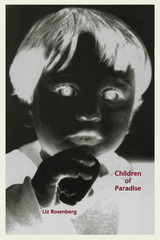
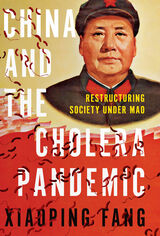
Mao Zedong’s Great Leap Forward campaign organized millions of Chinese peasants into communes in a misguided attempt to rapidly collectivize agriculture with disastrous effects. Catastrophic famine lingered as the global cholera pandemic of the early 1960s spread rampantly through the infected waters of southeastern coastal China. Confronted with a political crisis and the seventh global cholera pandemic in recorded history, the communist government committed to social restructuring in order to affirm its legitimacy and prevent transmission of the disease. Focusing on the Wenzhou Prefecture in Zhejiang Province, the area most seriously stricken by cholera at the time, Xiaoping Fang demonstrates how China’s pandemic was far more than a health incident; it became a significant social and political influence during a dramatic transition for the People’s Republic.
China and the Cholera Pandemic reveals how disease control and prevention, executed through the government’s large-scale, clandestine anticholera campaign, were integral components of its restructuring initiatives, aimed at restoring social order. The subsequent rise of an emergency disciplinary health state furthered these aims through quarantine and isolation, which profoundly impacted the social epidemiology of the region, dividing Chinese society and reinforcing hierarchies according to place, gender, and socioeconomic status.
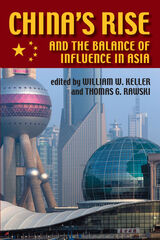
China's protracted boom and political transformation is a major episode in the history of global political economy. Beginning in the late 1970s, China experienced a quarter century of extraordinary growth that raised every indicator of material welfare, lifted several hundred million out of poverty, and rocketed China from near autarky to regional and even global prominence. These striking developments transformed China into a major U.S. trade and investment partner, a regional military power, and a major influence on national economies and cross-national interchange throughout the Pacific region. Beijing has emerged as a voice for East Asian economic interests and an arbiter in regional and even global diplomacy-from the Asian financial crisis to the North Korean nuclear talks. China's accession to the World Trade Organization promises to accentuate these trends.
The contributors to this volume provide a multifaceted examination of China in the areas of economics, trade, investment, politics, diplomacy, technology, and security, affording a greater understanding of what relevant policies the United States must develop. This book offers a counterweight to overwrought concerns about the emerging “Chinese threat” and makes the case for viewing China as a force for stability in the twenty-first century.

Over a period of seven years, Schak's fieldwork uncovers a structure of leadership, organizational methods, and alms-getting tactics. Moreover, certain members became upwardly mobile and able to leave this lifestyle. The severe stigma of gambling, adultery, and failure to marry proved the stimulus for a younger generation to leave begging behind.
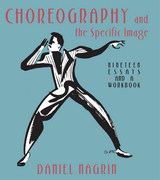
Spiced with wit and strong opinions, Choreography and the Specific Image explores, in nineteen far-ranging essays, the art of choreography through the life’s work of an important artist. A career of performance, creativity, and teaching spanning five decades, Nagrin reveals the philosophy and strategy of his work with Helen Tamiris, a founder of modern American dance, and of Workgroup, his maverick improvisation company of the 1970s. During an era when many dancers were working with movement as abstraction, Nagrin turned instead toward movement as metaphor, in the belief that dance should be about something. In Choreography and the Specific Image, Nagrin shares with the next generation of dancers just how that turn was accomplished.
“It makes no sense to make dances unless you bring news,” he writes. “You bring something that a community needs, something from you: a vision, an insight, a question from where you are and what churns you up.” In a workbook following the essays, Nagrin lays out a wealth of clear, effective exercises to guide dancers toward such constructive self-discovery. Unlike all other choreography books, Nagrin addresses the concerns of both modern and commercial (show dance) choreographers. “The need to discover the inner life,” he maintains, “is what fires the motion.”
This is Nagrin’s third book of a trilogy, following Dance and the Specific Image: Improvisation and The Six Questions: Acting Technique for Dance Performance. Each focuses on a different aspect of dance—improvisation, performance, and choreography—engaging the specific image as a creative tool.
Part history, part philosophy, part nuts-and-bolts manual, Choreography and the Specific Image will be an indispensable resource for all those who care passionately about the world of dance, and the world at large.

Chuck Noll did not need a dramatic public profile to be the catalyst for one of the greatest transformations in sports history. In the nearly four decades before he was hired, the Pittsburgh Steelers were the least successful team in professional football, never winning so much as a division title. After Noll’s arrival, his quiet but steely leadership quickly remolded the team into the most accomplished in the history of professional football. And what he built endured well beyond his time with the Steelers – who have remained one of America’s great NFL teams, accumulating a total of six Super Bowls, eight AFC championships, and dozens of division titles and playoff berths.
In this penetrating biography, based on deep research and hundreds of interviews, Michael MacCambridge takes the measure of the man, painting an intimate portrait of one of the most important figures in American football history. He traces Noll’s journey from a Depression-era childhood in Cleveland, where he first played the game in a fully integrated neighborhood league led by an African-American coach and then seriously pursued the sport through high school and college. Eventually, Noll played both defensive and offensive positions professionally for the Browns, before discovering that his true calling was coaching. MacCambridge reveals that Noll secretly struggled with and overcame epilepsy to build the career that earned him his place as “the Emperor” of Pittsburgh during the Steelers’ dynastic run in the 1970s, while in his final years, he battled Alzheimer’s in the shelter of his caring and protective family.
Noll’s impact went well beyond one football team. When he arrived, the city of steel was facing a deep crisis, as the dramatic decline of Pittsburgh’s lifeblood industry traumatized an entire generation. “Losing,” Noll said on his first day on the job, “has nothing to do with geography.” Through his calm, confident leadership of the Steelers and the success they achieved, the people of Pittsburgh came to believe that winning was possible, and their recovery of confidence owed a lot to the Steeler’s new coach. The famous urban renaissance that followed can only be understood by grasping what Noll and his team meant to the people of the city. The man Pittsburghers could never fully know helped them see themselves better.
Chuck Noll: His Life’s Work tells the story of a private man in a very public job. It explores the family ties that built his character, the challenges that defined his course, and the love story that shaped his life. By understanding the man himself, we can at last clearly see Noll’s profound influence on the city, players, coaches, and game he loved. They are all, in a real sense, heirs to the football team Chuck Noll built.
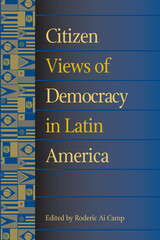
When Americans and Latin Americans talk about democracy, are they imagining the same thing? For years, researchers have suspected that fundamental differences exist between how North Americans view and appraise the concept of democracy and how Latin Americans view the same term. These differences directly affect the evolution of democratization and political liberalization in the countries of the region, and understanding them has tremendous consequences for U.S.–Latin American relations. But until now there has been no hard data to make “the definition of democracy” visible, and thus able to be interpreted. This book, the culmination of a monumental survey project, is the first attempt to do so.
Camp headed a research team that in 1998 surveyed 1,200 citizens in three countries—three distinct cases of democratic transition. Costa Rica is alleged to be the most democratic in Latin America; Mexico is a country in transition toward democracy; Chile is returning to democracy after decades of severe repression. The survey was
carefully designed to show how the average citizen in each of these nations understands democracy.
In Citizen Views of Democracy in Latin America, ten leading scholars of the region analyze and interpret the results. Written with scholar and undergraduate in mind, the essays explore the countries individually, showing how the meaning of democracy varies among them. A key theme emerges: there is no uniform “Latin American” understanding of democracy, though the nations share important patterns. Other essays trace issues across boundaries, such as the role of ethnicity on perceptions of democracy. Several of the contributors also compare democratic norms in Latin America with those outside the region, including the United States. Concluding essays analyze the institutional and policy consequences of the data, including how attitudes toward private versus public ownership are linked to democratization.
Every essay in the collection is based on the same data set, included on a CD-ROM packaged within each book, resulting in an organically cohesive work ideally suited for use in courses introducing Latin American and Third World politics, comparative politics, democratic transition, and research methods. Scholars and students may use the software and data set on the CD-ROM for comparative research projects linked to the essays in the volume.
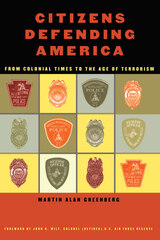
Today, concerns over homeland security have led thousands of Americans to volunteer for various citizen emergency response groups, such as the Civil Air Patrol, U.S. Coast Guard Auxiliary, Community Emergency Response Teams, fire units, etc. In Citizens Defending America, Martin Greenberg focuses new attention on the subject of citizen volunteerism by chronicling the nature and purpose of volunteer police units—authorized organizations of a public or private nature that work at deterring crime and/or preventing terrorism for little or no monetary compensation—in America since 1620. A number of these historical groups responsible for maintaining the civil order of the day—slave patrols, frontier posses, vice suppression societies, the American Protective League, for example—now seem controversial when viewed through a contemporary lens. Greenberg uses the history of such groups to reflect upon the nation’s past and to consider the possibilities for a safe and secure future. He also emphasizes the role of young people in the fields of security and safety, and stresses the need for more qualified, trained volunteers to help cope with man-made and natural disasters.
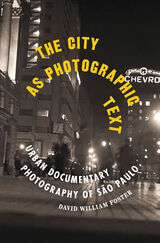
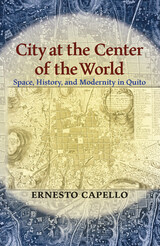
In the seventeenth century, local Jesuits and Franciscans imagined Quito as the “new Rome.” It was the site of miracles and home of saintly inhabitants, the origin of crusades into the surrounding wilderness, and the purveyor of civilization to the entire region. By the early twentieth century, elites envisioned the city as the heart of a modern, advanced society—poised at the physical and metaphysical centers of the world.
In this original cultural history, Ernesto Capello analyzes the formation of memory, myth, and modernity through the eyes of Quito’s diverse populations. By employing Mikhail Bakhtin’s concept of chronotopes, Capello views the configuration of time and space in narratives that defined Quito’s identity and its place in the world. He explores the proliferation of these imaginings in architecture, museums, monuments, tourism, art, urban planning, literature, religion, indigenous rights, and politics. To Capello, these tropes began to crystallize at the end of the nineteenth century, serving as a tool for distinct groups who laid claim to history for economic or political gain during the upheavals of modernism.
As Capello reveals, Quito’s society and its stories mutually constituted each other. In the process of both destroying and renewing elements of the past, each chronotope fed and perpetuated itself. Modern Quito thus emerged at the crux of Hispanism and Liberalism, as an independent global society struggling to keep the memory of its colonial and indigenous roots alive.
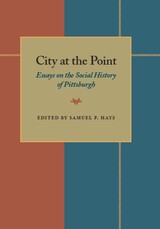
An overview of scholarly research, both published and previously unpublished, on the history of a city that has often served as a case study for measuring social change. It synthesizes the literature and assesses how that knowledge relates to our broader understanding of the processes of urbanization and urbanism.
This book is especially useful for undergraduate and graduate courses on environmental politics and policy making, or as a supplement for courses on public policy making generally.
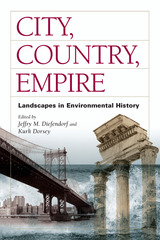
In the urgently expanding field of environmental history, two trends are emerging. Research has internationalized, crossing political and historical borders. And urban spaces are increasingly seen as part of, not apart from, the global environment. In this book, Jeffry Diefendorf and Kurk Dorsey have gathered much of the important work pushing the field in new directions. Eleven essays by prominent and regionally diverse scholars address how human and natural forces collaborate in the creation of cities, the countryside, and empires.
The Cities section features essays that examine pollution and its aftermath in Pittsburgh, the Ruhr Valley (Germany), and Los Angeles. These urban areas are far apart on the globe but closely linked in their histories of how human decision making has affected the environment.
Changing rural and suburban spaces are the focus of Countryside. Elizabeth Blackmar "follows the money" in order to understand why the financing of suburban mall developments makes local resistance difficult. Studies of the fractious history of the creation of a wildlife refuge in Oregon and the ongoing impact of hydraulic mining in the early California goldmining era emphasize the misuse of technology in rural spaces.
Such misuse is a central idea of Empires. In "When Stalin Learned to Fish," Paul R. Josephson tells the story of Soviet fishing technology designed to "harness fish to the engine of socialism." Other essays explore the failures of Western agricultural technology in Africa and the relationship between such technology and disease in European attempts to conquer the Caribbean. In a stirring, wide-ranging consideration of the neo-European colonies (the United States, Australia, Canada, and New Zealand), Thomas R. Dunlap observes the ongoing, unsettled interaction of lands and dreams. An afterword by Alfred W. Crosby, an eminent scholar of environmental history, closes the book with a broad and insightful synthesis of the history and future of this critical field.

The weekly magazine Garden and Forest existed for only nine years (1888–1897). Yet, in that brief span, it brought to light many of the issues that would influence the future of American environmentalism. In The City Natural, Shen Hou presents the first “biography” of this important but largely overlooked vehicle for individuals with the common goal of preserving nature in American civilization.
As Hou’s study reveals, Garden and Forest was instrumental in redefining the fields of botany and horticulture, while also helping to shape the fledgling professions of landscape architecture and forestry. The publication actively called for reform in government policy, urban design, and future planning for the preservation and inclusion of nature in cities. It also attempted to shape public opinion on these issues through a democratic ideal that every citizen had the right (and need) to access nature. These notions would anticipate the conservation and “city beautiful” movements that followed in the early twentieth century.
Hou explains the social and environmental conditions that led to the rise of reform efforts, organizations, and publications such as Garden and Forest. She reveals the intellectual core and vision of the magazine as a proponent of the city natural movement that sought to relate nature and civilization through the arts and sciences. Garden and Forest was a staunch advocate of urban living made better through careful planning and design. As Hou shows, the publication also promoted forest management and preservation, not only as a natural resource but as an economic one. She also profiles the editors and contributors who set the magazine’s tone and follows their efforts to expand America’s environmental expertise.
Through the pages of Garden and Forest, the early period of environmentalism was especially fruitful and optimistic; many individuals joined forces for the benefit of humankind and helped lay the foundation for a coherent national movement. Shen Hou’s study gives Garden and Forest its due and adds an important new chapter to the early history of American environmentalism.
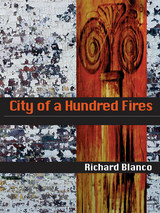
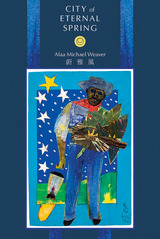
This is the final book in the Plum Flower Trilogy by Afaa Michael Weaver, published by the University of Pittsburgh Press. The two earlier books, The Plum Flower Dance: Poems 1985 to 2005 and The Government of Nature, reveal similar themes that address the author’s personal experience with childhood abuse through the context of Daoist renderings of nature as a metaphor for the human body, with an eye to recovery and forgiveness in a very eclectic spiritual life. City of Eternal Spring chronicles Weaver’s travels abroad in Taiwan and China, as well as showing the limits of cultural influence.
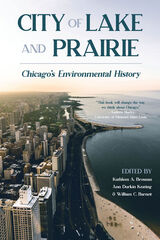
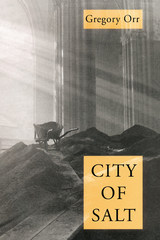
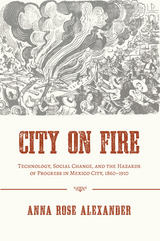
City on Fire demonstrates that both public and private engagements with fire risk highlight the inequalities that characterized Mexican society at the turn of the twentieth century.
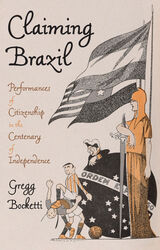
Brazil marked its centennial as an independent country in 1922. Claiming Brazil explores how Brazilians from different walks of life commemorated the event, and how this led to conflicting ideas of national identity. Civic rituals hold enormous significance, and Brazilian citizens, immigrants, and visitors employed them to articulate and perform their sense of what Brazil was, stood for, and could be. Gregg Bocketti argues that these celebrations, rather than uniting the country, highlighted tensions between modernity and tradition, over race and ethnicity, and between nation and region. Further, the rituals contributed to the collapse of the country’s social and political status quo and gave substance to the debates and ideas that characterized Brazilian life in the 1920s and then under the transformative rule of Getúlio Vargas (1930–1945). Now, at the bicentennial of Brazil’s independence, which itself unfolds in a period of political crisis and economic dislocation, and in the aftermath of several large civic events, it is an opportune moment to consider how Brazilians used civic rituals to engage with questions of identity, belonging, and citizenship one hundred years ago.
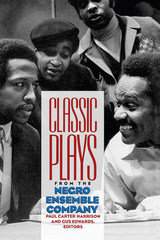
This anthology celebrates more than twenty-five years of the Negro Ensemble Company’s significant contribution to American theater. Collected here are ten plays most representative of the eclectic nature of the Negro Ensemble Company repertoire.
The Negro Ensemble Company (NEC) was formed in New York City in 1967 with support from the Ford Foundation to aid in the establishment of an independent African-American theater institution. Under the artistic directorship of Douglas Turner Ward, the NEC offered a nurturing environment to black playwrights and actors who could work autonomously, guaranteeing authenticity of voice, full freedom of expression, and exploration of thematic views specific to the African-American experience.
Since its inception, the NEC has introduced audiences to more than 150 theatrical works. <I>Classic Plays from the Negro Ensemble Company</I> allows scholars to review a diversity of styles which share common philosophical, mythic, and social ideals that can be traced to an African worldview. A foreword by Douglas Turner Ward and an afterword by Paul Carter Harrison and Gus Edwards assess the literary and/or stylistic significance of the plays and place each work in its historical or chronological context.
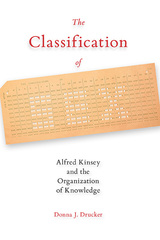
Kinsey’s doctoral work included extensive research of the gall wasp, where he gathered and recorded variations in over six million specimens. His classification and reclassification of Cynips led to the speciation of the genus that remains today. During his graduate training, Kinsey developed a strong interest in evolution and the links between entomological and human behavior studies. In 1920, he joined Indiana University as a professor in zoology, and soon published an introductory text on biology, followed by a coauthored field guide to edible wild plants.
In 1938, Kinsey began teaching a noncredit course on marriage, where he openly discussed sexual behavior and espoused equal opportunity for orgasmic satisfaction in marital relationships. Soon after, he began gathering case histories of sexual behavior. As a pioneer in the nascent field of sexology, Kinsey saw that the key to its cogency was grounded in observation combined with the collection and classification of mass data. To support the institutionalization of his work, he cofounded the Institute for Sex Research at Indiana University in 1947. He and his staff eventually conducted over eighteen thousand personal interviews about sexual behavior, and in 1948 he published Sexual Behavior in the Human Male, to be followed in 1953 by Sexual Behavior in the Human Female.
As Drucker’s study shows, Kinsey’s scientific rigor and his early use of data recording methods and observational studies were unparalleled in his field. Those practices shaped his entire career and produced a wellspring of new information, whether he was studying gall wasp wings, writing biology textbooks, tracing patterns of evolution, or developing a universal theory of human sexuality.
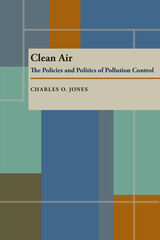
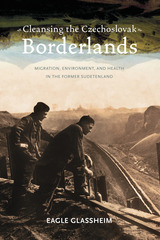
Prior to their expulsion in 1945, ethnic Germans had inhabited the Sudeten borderlands for hundreds of years, with deeply rooted local cultures and close, if sometimes tense, ties with Bohemia’s Czech majority. Cynically, if largely willingly, harnessed by Hitler in 1938 to his pursuit of a Greater Germany, the Sudetenland’s three million Germans became the focus of Czech authorities in their retributive efforts to remove an alien ethnic element from the body politic—and claim the spoils of this coal-rich, industrialized area. Yet, as Glassheim reveals, socialist efforts to create a modern utopia in the newly resettled “frontier” territories proved exceedingly difficult. Many borderland regions remained sparsely populated, peppered with dilapidated and abandoned houses, and hobbled by decaying infrastructure. In the more densely populated northern districts, coalmines, chemical works, and power plants scarred the land and spewed toxic gases into the air. What once was a diverse religious, cultural, economic, and linguistic “contact zone,” became, according to many observers, a scarred wasteland, both physically and psychologically.
Glassheim offers new perspectives on the struggles of reclaiming ethnically cleansed lands in light of utopian dreams and dystopian realities—brought on by the uprooting of cultures, the loss of communities, and the industrial degradation of a once-thriving region. To Glassheim, the lessons drawn from the Sudetenland speak to the deep social traumas and environmental pathologies wrought by both ethnic cleansing and state-sponsored modernization processes that accelerated across Europe as a result of the great wars of the twentieth century.




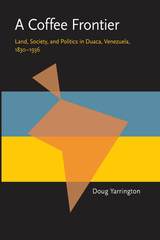


This novel approach to epistemological discourse explains the complex but crucial role that systematization plays-not just for the organization of what we know, but also for its validation. Cognitive Harmony argues for a new conception of the process philosophers generally call induction.
Relying on the root definition of harmony, a coherent unification of component parts (systemic integrity) in such a way that the final object can successfully accomplish what it was meant to do (evaluative positivity), Rescher discusses the role of harmony in cognitive contexts, the history of cognitive harmony, and the various features it has in producing human knowledge. The book ends on the issue of philosophy and the sort of harmony required of philosophical systems.
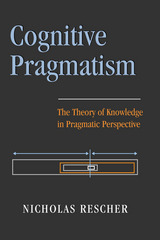
Nicholas Rescher tackles the major questions of philosophical inquiry, pondering the nature of truth and existence. In the authoritative voice and calculated manner that we’ve come to expect from this distinguished philosopher, Rescher argues that the development of knowledge is a practice, pursued by humans because we have a need for its products. This pragmatic approach satisfies our innate urge as humans to make sense of our surroundings.
Taking his discussion down to the level of particular details, and addressing such topics as inductive validation, hypostatization fallacies, and counterfactual reasoning, Rescher abandons abstract generalities in favor of concrete specifics. For example, philosophers usually insist that to reason logically from a counterfactual, we must imagine a possible world in which the statement is fact. But Rescher argues that there’s no need to attempt to accept the facts of a world outside our cognition in order to reason from them. He shows us how we can use our own natural system of prioritizing, our own understanding of the fundamental, to resolve the inconsistencies in such statements as, “If the Eiffel Tower were in Manhattan, then it would be in New York State.”
In using dozens of real-world examples such as these, and in arguing in his characteristically succinct style, Rescher casts light on a wide variety of concrete issues in the classical theory of knowledge, and reassures us along the way that the inherent limitations on our knowledge are no cause for distress. In pragmatic theory and inquiry, we must accept that the best we can do is good enough, because we only have a certain (albeit large) set of tools and conceptualizations available to us.
A unique synthesis, this endeavor into pragmatic epistemology will be of interest to scholars and students of philosophy and cognitive science.

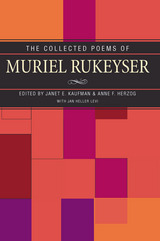
Muriel Rukeyser held a visionary belief in the human capacity to create social change through language. She earned an international reputation as a powerful voice against enforced silences of all kind, against the violence of war, poverty, and racism. Her eloquent poetry of witness-of the Scottsboro Nine, the Spanish Civil War, the poisoning of the Gauley Bridge laborers-split the darkness covering a shameful world.
In addition to the complete texts of her twelve previously published books, this volume also features new poems discovered by the editors; Rukeyser's translations, including the first English translations of Octavio Paz's work; early work by Rukeyser not previously published in book form; and the controversial book-length poem Wake Island. An introduction by the editors traces Rukeyser's life and literary reputation and complements discerning annotations and textual notes to the poems.
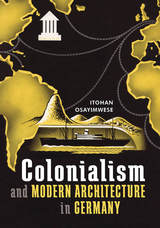
Offering in-depth interpretations across the fields of architectural history and postcolonial studies, Itohan Osayimwese considers the effects of colonialism, travel, and globalization on the development of modern architecture in Germany from the 1850s until the 1930s. Since architectural developments in nineteenth-century Germany are typically understood as crucial to the evolution of architecture worldwide in the twentieth century, this book globalizes the history of modern architecture at its founding moment.
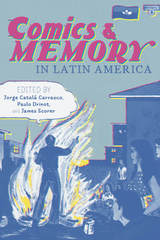

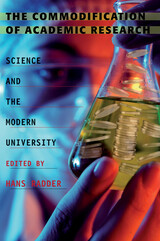
Selling science has become a common practice in contemporary universities. This commodification of academia pervades many aspects of higher education, including research, teaching, and administration. As such, it raises significant philosophical, political, and moral challenges. This volume offers the first book-length analysis of this disturbing trend from a philosophical perspective and presents views by scholars of philosophy of science, social and political philosophy, and research ethics.
The epistemic and moral responsibilities of universities, whether for-profit or nonprofit, are examined from several philosophical standpoints. The contributors discuss the pertinent epistemological and methodological questions, the sociopolitical issues of the organization of science, the tensions between commodified practices and the ideal of “science for the public good,” and the role of governmental regulation and personal ethical behavior. In order to counter coercive and corruptive influences of academic commodification, the contributors consider alternatives to commodified research and offer practical recommendations for establishing appropriate research standards, methodologies and institutional arrangements, and a corresponding normative ethos.
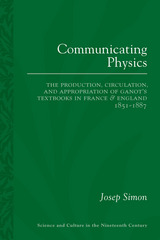
The textbooks written by Adolphe Ganot (1804–1887) played a major role in shaping the way physics was taught in the nineteenth century. Ganot's books were translated from their original French into more than ten languages, including English, allowing their adoption as standard works in Britain and spreading their influence as far as North America, Australia, India and Japan.
Simon's Franco-British case study looks at the role of Ganot's two textbooks: Traité élémentaire de physique expérimentale et appliquée (1851) and Cours de physique purement expérimentale (1859), and their translations into English by Edmund Atkinson. The study is novel for its international comparison of nineteenth-century physics, its acknowledgement of the role of book production on the impact of the titles and for its emphasis on the role of communication in the making of science.
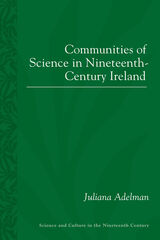
Adelman’s study examines the practical educational impact of the growth of science in these communities, and the impact of this on the country’s economy; the role of museums and exhibitions in spreading scientific knowledge; and the role that science had to play in Ireland’s turbulent political context.
Adelman challenges historians to reassess the relationship between science and society, showing that the unique situation in Victorian Ireland can nonetheless have important implications for wider European interpretations of the development of this relationship during a period of significant change.
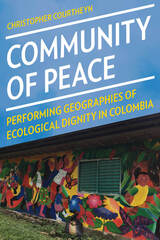
Achieving peace is often thought about in terms of military operations or state negotiations. Yet it also happens at the grassroots level, where communities envision and create peace on their own. The San José de Apartadó Peace Community of small-scale farmers has not waited for a top-down peace treaty. Instead, they have actively resisted forced displacement and co-optation by guerrillas, army soldiers, and paramilitaries for two decades in Colombia’s war-torn Urabá region. Based on ethnographic action research over a twelve-year period, Christopher Courtheyn illuminates the community’s understandings of peace and territorial practices against ongoing assassinations and displacement. San José’s peace through autonomy reflects an alternative to traditional modes of politics practiced through electoral representation and armed struggle. Courtheyn explores the meaning of peace and territory, while also interrogating the role of race in Colombia’s war and the relationship between memory and peace. Amid the widespread violence of today’s global crisis, Community of Peace illustrates San José’s rupture from the logics of colonialism and capitalism through the construction of political solidarity and communal peace.
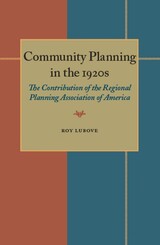
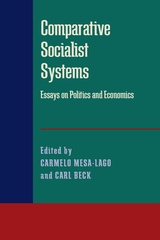
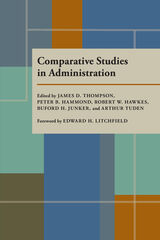
This volume is intended as a contribution to the study of administration. The contributors represent several branches of social and behavioral sciences, including anthropology, economics, industrial management, sociology, and social psychology. The data for the empirical studies were gathered in the United States, Germany, Great Britain, Norway, West Africa, and the Fox Indian society, and from different types of organizations, including manufacturing, mining, shipping, higher education, hospitals, the military, and social welfare agencies.
Contributors: Frederick L. Bates; Warren G. Bennis; Frank A. Cassell; Rose Laub Coser; William R. Dill; Frederick H. Harbison; Ernst Köchling; Walter B. Miller; Stephen A. Richardson; Heinrich C. Ruebmann; Edward J. Thomas; and the editors.

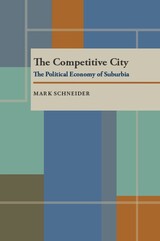
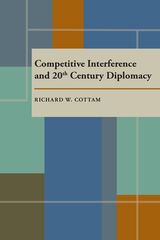
With nuclear proliferation essentially eliminating full-scale warfare, governments have increasingly turned to what Richard W. Cottam calls competitive interference. This type of policy invokes counter-insurgency, political, economic, and psychological manipulations, and often involves looking deeply into the internal affairs of a country, often secretly. Cottam describes and defines competitive interference, explores the United States' institutional adjustment to it, and provides a theoretical framework for projection and evaluation of foreign policy in this changing diplomatic arena. He uses case studies of international relationships involving the United States, India, China, Vietnam, Iran, and the former USSR and East Germany to evaluate his theoretical stance, and proposes long-term institutionalization of policy, rather than covert operations.
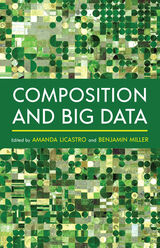
In a data-driven world, anything can be data. As the techniques and scale of data analysis advance, the need for a response from rhetoric and composition grows ever more pronounced. It is increasingly possible to examine thousands of documents and peer-review comments, labor-hours, and citation networks in composition courses and beyond. Composition and Big Data brings together a range of scholars, teachers, and administrators already working with big-data methods and datasets to kickstart a collective reckoning with the role that algorithmic and computational approaches can, or should, play in research and teaching in the field. Their work takes place in various contexts, including programmatic assessment, first-year pedagogy, stylistics, and learning transfer across the curriculum. From ethical reflections to database design, from corpus linguistics to quantitative autoethnography, these chapters implement and interpret the drive toward data in diverse ways.
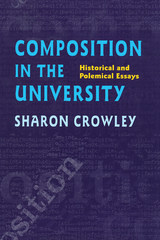
Composition in the University examines the required introductory course in composition within American colleges and universities. Crowley argues that due to its association with literary studies in English departments, composition instruction has been inappropriately influenced by humanist pedagogy and that modern humanism is not a satisfactory rationale for the study of writing. Crowley envisions possible nonhumanist rationales that could be developed for vertical curricula in writing instruction, were the universal requirement not in place.
Composition in the University examines the required introductory course in composition within American colleges and universities. According to Sharon Crowley, the required composition course has never been conceived in the way that other introductory courses have been—as an introduction to the principles and practices of a field of study. Rather it has been constructed throughout much of its history as a site from which larger educational and ideological agendas could be advanced, and such agendas have not always served the interests of students or teachers, even though they are usually touted as programs of study that students “need.”
If there is a master narrative of the history of composition, it is told in the institutional attitude that has governed administration, design, and staffing of the course from its beginnings—the attitude that the universal requirement is in place in order to construct docile academic subjects.
Crowley argues that due to its association with literary studies in English departments, composition instruction has been inappropriately influenced by humanist pedagogy and that modern humanism is not a satisfactory rationale for the study of writing. She examines historical attempts to reconfigure the required course in nonhumanist terms, such as the advent of communications studies during the 1940s. Crowley devotes two essays to this phenomenon, concentrating on the furor caused by the adoption of a communications program at the University of Iowa.
Composition in the University concludes with a pair of essays that argue against maintenance of the universal requirement. In the last of these, Crowley envisions possible nonhumanist rationales that could be developed for vertical curricula in writing instruction, were the universal requirement not in place.
Crowley presents her findings in a series of essays because she feels the history of the required composition course cannot easily be understood as a coherent narrative since understandings of the purpose of the required course have altered rapidly from decade to decade, sometimes in shockingly sudden and erratic fashion.
The essays in this book are informed by Crowley’s long career of teaching composition, administering a composition program, and training teachers of the required introductory course. The book also draw on experience she gained while working with committees formed by the Conference on College Composition and Communication toward implementation of the Wyoming Resolution, an attempt to better the working conditions of post-secondary teachers of writing.
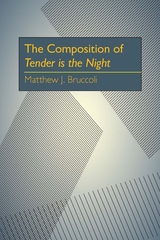
Working with the complete collection of Tender is the Night manuscripts in the Princeton University Library, Matthew J. Bruccoli reconstructs seventeen drafts and three versions of the novel to answer questions about F. Scott Fitzgerald’s major work that have long puzzled critics of modern literature.
In 1934, nine years after the appearance of The Great Gatsby, Fitzgerald permitted publication of Tender is the Night. Disappointed by its critical reception, Fitzgerald suggested that the structure of the novel should be drastically rearranged. In 1951, eleven years after his death, Charles Scribner’s Sons brought out an edition that incorporated Fitzgerald’s changes. Controversy arose over the merits of the two published versions and over the “nine lost years” in Fitzgerald’s life between his two great novels, years of rewriting before publication of Tender is the Night that resulted in six cartons of notes and drafts. After analyzing this wealth of material, Bruccoli reconstructs every working stage in the novel and reaches his own conclusions about which edition is the most valid.
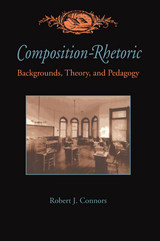
Connors provides a history of composition and its pedagogical approaches to form, genre, and correctness. He shows where many of the today’s practices and assumptions about writing come from, and he translates what our techniques and theories of teaching have said over time about our attitudes toward students, language and life.
Connors locates the beginning of a new rhetorical tradition in the mid-nineteenth century, and from there, he discusses the theoretical and pedagogical innovations of the last two centuries as the result of historical forces, social needs, and cultural shifts.
This important book proves that American composition-rhetoric is a genuine, rhetorical tradition with its own evolving theria and praxis. As such it is an essential reference for all teachers of English and students of American education.
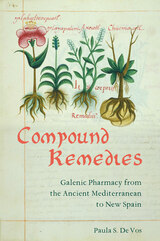
Compound Remedies examines the equipment, books, and remedies of colonial Mexico City’s Herrera pharmacy—natural substances with known healing powers that formed part of the basis for modern-day healing traditions and home remedies in Mexico. Paula S. De Vos traces the evolution of the Galenic pharmaceutical tradition from its foundations in ancient Greece to the physician-philosophers of medieval Islamic empires and the Latin West and eventually through the Spanish Empire to Mexico, offering a global history of the transmission of these materials, knowledges, and techniques. Her detailed inventory of the Herrera pharmacy reveals the many layers of this tradition and how it developed over centuries, providing new perspectives and insight into the development of Western science and medicine: its varied origins, its engagement with and inclusion of multiple knowledge traditions, the ways in which these traditions moved and circulated in relation to imperialism, and its long-term continuities and dramatic transformations. De Vos ultimately reveals the great significance of pharmacy, and of artisanal pursuits more generally, as a cornerstone of ancient, medieval, and early modern epistemologies and philosophies of nature.
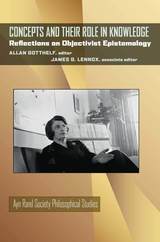
The philosopher and novelist Ayn Rand (1905–1982) is a cultural phenomenon. Her books have sold more than twenty-eight million copies, and countless individuals speak of her writings as having significantly influenced their lives. Despite her popularity, Rand’s philosophy of Objectivism has received little serious attention from academic philosophers.
Concepts and Their Role in Knowledge offers scholarly analysis of key elements of Ayn Rand’s radically new approach to epistemology. The four essays, by contributors intimately familiar with this area of her work, discuss Rand’s theory of concepts—including its new account of abstraction and essence—and its central role in her epistemology; how that view leads to a distinctive conception of the justification of knowledge; her realist account of perceptual awareness and its role in the acquisition of knowledge; and finally, the implications of that theory for understanding the growth of scientific knowledge. The volume concludes with critical commentary on the essays by distinguished philosophers with differing philosophical viewpoints and the author’s responses to those commentaries.
This is the second book published in Ayn Rand Society Philosophical Studies, which was developed in conjunction with the Ayn Rand Society to offer a fuller scholarly understanding of this highly original and influential thinker. The Ayn Rand Society, an affiliated group of the American Philosophical Association, Eastern Division, seeks to foster scholarly study by philosophers of the philosophical thought and writings of Ayn Rand.
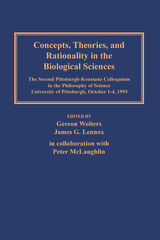
In October 1993, the University of Pittsburgh hosted the Second Pittsburgh-Konstanz Colloquium in the Philosophy of Science, with a focus on the rapidly growing field of philosophy of biology. An interdisciplinary group of philosophers and scientists came together to discuss the basic theories and concepts of biology and their connections with ethics, economics, and psychology. The colloquium organizers strove to create an event that would provide attendees with a wide overview on the current state of the philosophy of biology, with as many topics and views on these topics as possible. Those presentations are gathered here in a volume that offers the reader a varied and thorough survey of the field.
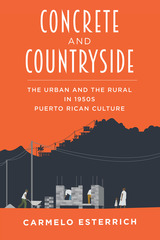
By examining a wide range of cultural texts, but focusing on the film production of the Division of Community Education, the popular dance music of Cortijo y su combo, and the literary texts of Jose Luis Gonzalez and Rene Marques, Concrete and Countryside offers an in-depth analysis of how Puerto Ricans responded to this transformative period. It also shows how the arts used a battery of images of the urban and the rural to understand, negotiate, and critique the innumerable changes taking place on the island.

Education policy provides a fertile ground for analyzing the perennial tug-of-war between interest groups and public officials. Baumgartner considers thirty examples of French education policymaking during the early 1980s using a combination of documentary evidence, interviews with more than 100 politicians, civil servants, members of parliament, union and interest group leaders, and a thorough analysis of press coverage of education topics.
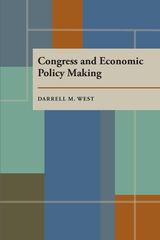
Economic policymaking has perpetually been one of the central dilemmas facing Congress, leading to huge budget deficits and disagreements among legislators about spending priorities and tax policies.
This book examines congressional decision making on economic policy during the Reagan administration. It looks at legislative actions on Reaganomics, tax reform, and the politics of deficit reduction, and shows the importance of looking not just at the consequences of these decisions but also at the legislative processes that led to them.
Using an “activist-based” approach and previously unexamined data, Darrell West shows that district activists, often more conservative than the public at large, exerted a disproportionate and misleading effect on congressional voting. When this support eventually proved unstable, a more skeptical Congress began to eventually back away from the president's policies. This move had serious consequences for deficit reduction and policy initiation, and also influenced the final shape of the tax reform package adopted in 1986.
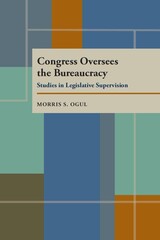
Congressional supervision of the way the executive implements legislative mandates-“oversight” of the bureaucracy-is one of the most complex and least understood functions of Congress. In this book, Morris Ogul clarifies the meaning of oversight and analyzes the elements that contribute to its success or neglect.
Ogul's work is based on case studies from nearly one hundred interviews with congressmen, committee staff members, lobbyists, and members of the executive branch., as well as an examination of relevant congressional documents.
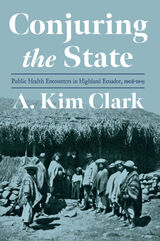
The First English-Language Book on the History of Public Health in Ecuador during the Early and Mid-Twentieth Century
The Ecuadorian Public Health Service was founded in 1908 in response to the arrival of bubonic plague to the country. A. Kim Clark uses this as a point of departure to explore questions of social history and public health by tracing how the service extended the reach of its broader programs across the national landscape and into domestic spaces. Delving into health conditions in the country—especially in the highlands—and efforts to combat disease, she shows how citizens’ encounters with public health officials helped make abstract ideas of state government tangible. By using public health as a window to understand social relations in a country deeply divided by region, class, and ethnicity, Conjuring the State examines the cultural, social, and political effects of the everyday practices of public health officials.

A long history of migration, trade, and shared interests links China to Latin America and the Caribbean. Over the past twenty years, China has increased direct investment and restructured trade relations in the region. In addition, Chinese public sector enterprises, private companies, and various branches of the central government have planned, developed, and built a large number of infrastructure projects in Latin America and the Caribbean, such as dams, roads, railways, energy grids, security systems, telecommunication networks, hospitals, and schools. These projects have had a profound impact on local environments and economies and help shape the lived experiences of individuals. Each chapter in this volume examines how the impact of these infrastructure projects varies in different countries, focusing on how they produce new forms of global connectivity between various sectors of the economy and the resulting economic and cultural links that permeate everyday life
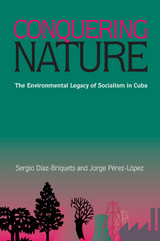
Conquering Nature provides the only book-length analysis of the environmental situation in Cuba after four decades of socialist rule, based on extensive examination of secondary sources, informed by the study of development and environmental trends in former socialist countries as well as in the developing world. It approaches the issue comprehensively and from interdisciplinary, comparative, and historical perspectives. Based on the Cuban example, Díaz-Briquets and Pérez-López challenge the concept that environmental disruption was not supposed to occur under socialism since it was alleged that guided by scientific policies, socialism could only beget environmentally benign economic development. In reality, the socialist environmental record proved to be far different from the utopian view.
Between the early 1960s and the late 1980s the environmental situation worsened despite Cuba’s achieving one of the lowest population growth rates in the world and having eliminated extreme living standard differentials in rural areas, two of the primary reasons often blamed for environmental deterioration in developing countries. The government’s approach was to “conquer nature” and under its central planning approach, it did not take local circumstances into consideration. This disregard for the environmental consequences of development projects continues to this day despite official allegations to the contrary—as the country pursues an economic survival strategy based on the crash development of the tourist sector and exploitation of natural resources. An underlying conclusion of the book is that the environmental legacy of socialism will present serious challenges to future Cuban generations.
Conquering Nature provides, for the first time, a relevant analysis of socialist environmental policies of a developing country. It will be of interest to students and scholars of Cuba and those interested in environmental issues in developing countries.
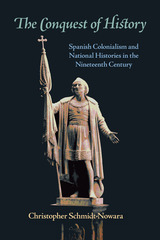
As Spain rebuilt its colonial regime in Cuba, Puerto Rico, and the Philippines after the Spanish American revolutions, it turned to history to justify continued dominance. The metropolitan vision of history, however, always met with opposition in the colonies.
The Conquest of History examines how historians, officials, and civic groups in Spain and its colonies forged national histories out of the ruins and relics of the imperial past. By exploring controversies over the veracity of the Black Legend, the location of Christopher Columbus’s mortal remains, and the survival of indigenous cultures, Christopher Schmidt-Nowara’s richly documented study shows how history became implicated in the struggles over empire. It also considers how these approaches to the past, whether intended to defend or to criticize colonial rule, called into being new postcolonial histories of empire and of nations.
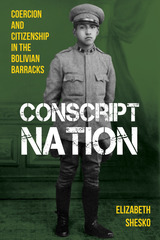
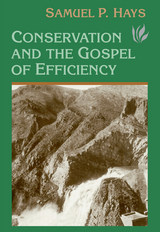
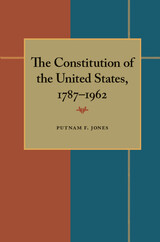
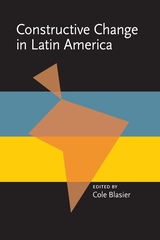
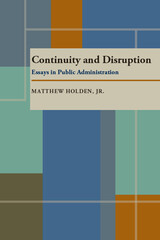
Through thoughtful essays linking historical concepts, current issues, and areas for future research, Matthew Holden, Jr., argues that the study of public administration is indispensable to understanding politics. Essentially, public administration consists of making decisions about information, money, and force-three crucial sources of power: politics and administration cannot be separated, and no political system can be sustained when its administrative core collapses.
Holden explores issues in administration as reflected in political theory and discusses the specifics of organization, bureaucratic, and management theory. He considers such concepts as executive leadership and the emergence of administrative law and turns an unblinking eye on the practice of public administration today, buffeted by changes in communications technology and by ethnic diversity.
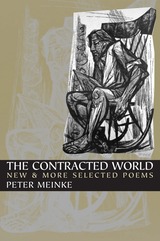
The Contracted World includes representative poems from four of Peter Meinke's previous collections. In poems that show us what it is like to grow up in America, love, nature, cities, sports, war, and peace are filtered through the imagination and verbal skills of one of our brightest poets.
The new poems experiment with form, and address a life that is shrinking in specific ways: the poet is aging, the world is getting smaller, our post-9/11 freedoms are eroding, and our choices seem fewer and less attractive. Despite feelings of anger and loneliness, the narrator speaks to us in a personal, accessible, and often humorous voice.
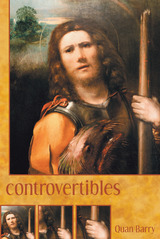
Samantha Smith, Richard Nixon, the Shroud of Turin, Igor Stravinsky, the largo from Handel's Xerxes, the resurrection of Lazarus, and the groundbreaking 1984 Apple Computer Super Bowl commercial are among the many disparate people and objects Barry uses to explore the multifaceted nature of existence.
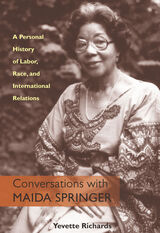
Born in Panama in 1910, Maida Springer grew up in Harlem. While still a young girl she learned firsthand of the bleak employment options available to African American females of her time. After one employer closed his garment shop and ran off with the workers’ wages in the midst of the Depression, Springer joined Local 22 of the International Ladies’ Garment Workers’ Union.
This proved to be the first step in a remarkable advancement through the ranks of labor leadership positions that were typically dominated by white men. Ultimately, Springer became one of the AFL-CIO’s most important envoys to emerging African nations, earning her the nickname "Mama Maida" throughout that continent.
In this brilliantly edited collection of interviews, Yevette Richards allows Springer to tell her story in her own words. The result is a rare glimpse into the private struggles and thoughts behind one of the twentieth century’s most fascinating international labor leaders.
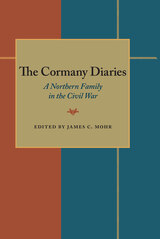
Rachel Cormany (nee Bowman) met Samuel Cormany at Otterbein University in Ohio. After her husband enlisted in a cavalry unit, she writes poignantly of her anxieties, poverty, and loneliness. Samuel, on the other hand, is ambitious in his military career, and tells enthusiastically about his engagements that include camp life, cavalry raids, army politics, and his battles with alcohol. Editor James C. Mohr has arranged the diaries so that the voices of husband and wife alternate, and his notes enlighten many of the issues relating to the diarists and their daily lives.
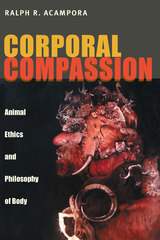
Most approaches to animal ethics ground the moral standing of nonhumans in some appeal to their capacities for intelligent autonomy or mental sentience. Corporal Compassion emphasizes the phenomenal and somatic commonality of living beings; a philosophy of body that seeks to displace any notion of anthropomorphic empathy in viewing the moral experiences of nonhuman living beings. Ralph R. Acampora employs phenomenology, hermeneutics, existentialism and deconstruction to connect and contest analytic treatments of animal rights and liberation theory. In doing so, he focuses on issues of being and value, and posits a felt nexus of bodily being, termed symphysis, to devise an interspecies ethos. Acampora uses this broad-based bioethic to engage in dialogue with other strains of environmental ethics and ecophilosophy.
Corporal Compassion examines the practical applications of the somatic ethos in contexts such as laboratory experimentation and zoological exhibition and challenges practitioners to move past recent reforms and look to a future beyond exploitation or total noninterference--a posthumanist culture that advocates caring in a participatory approach.
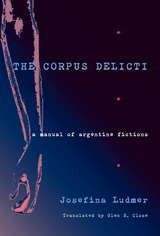
An intellectual tour de force from one of today’s leading critics of Latin American literature and culture, The Corpus Delicti (The Body of Crime) is a manual of crime, a compendium of crime tales, and an extended meditation on the central role of crime in literature, in life, and in the life of the nation.
Drawing her examples from canonical texts, popular novels, newspaper serials, and more, Josefina Ludmer captures the wide range of Argentine crime stories and detective fiction from the late nineteenth and early twentieth centuries. She offers more than a mere genre study, examining the relationship of crime and punishment to the formation of law, the body, and the modern state, exposing the ways in which literature—both high art and mass culture—can help construct, not just represent, social reality.
Covering a dazzling array of primary sources, social history, and cultural theory, this provocative work is also a structural masterpiece, challenging readers as it charts new roles for text and notes. In this redefined dialogue, the notes variously offer alternate views, additional insights, and, often, parallel commentaries. Glen Close’s stylish translation captures the energy of Ludmer’s prose—simultaneously subtle and daring—for English-language readers.


READERS
Browse our collection.
PUBLISHERS
See BiblioVault's publisher services.
STUDENT SERVICES
Files for college accessibility offices.
UChicago Accessibility Resources
home | accessibility | search | about | contact us
BiblioVault ® 2001 - 2024
The University of Chicago Press









